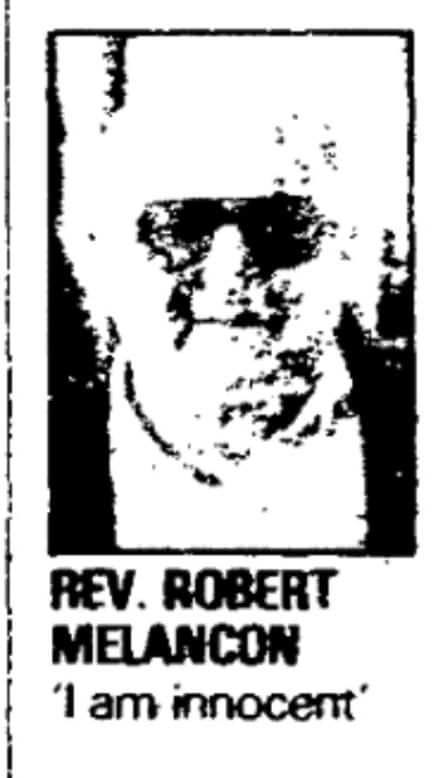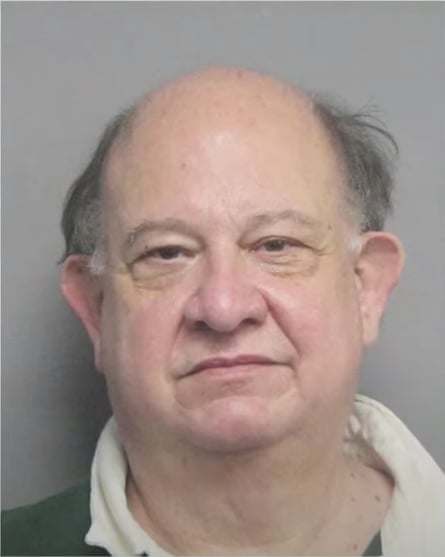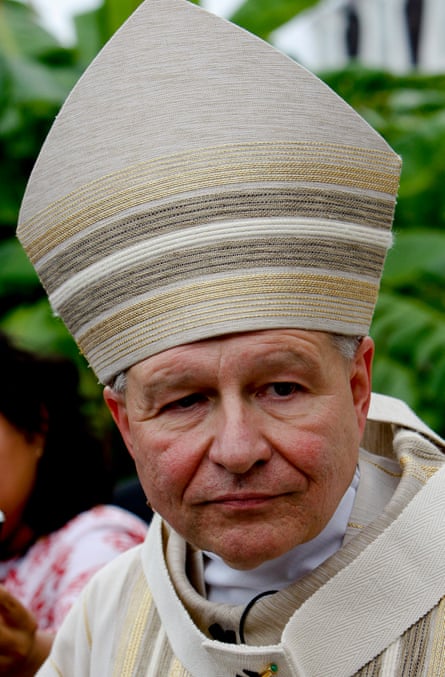— ‘I join you in the prayer to guide those regarding your appeal,’ Gregory Aymond of New Orleans wrote to priest given life sentence

As he reached the end of his 41-year life, Kevin Portier had endured child rape at the hands of a southern Louisiana Catholic priest for whom he had served as an altar boy; a highly publicized trial that sent the clergyman to prison for the rest of his days; and the trauma associated with those experiences.
But one of Portier’s harshest ordeals came within his final two years alive. Representatives of the church that he had been raised to believe in approached him at his home, at his job and at a relative’s funeral to ask him to lend his support to efforts to secure an early release for his rapist, Robert Melancon.
“I don’t know what the real deal is,” Portier wrote in a fall 2017 email seeking answers from leaders of his local diocese, who didn’t realize until later that the people lobbying for Melancon’s release were actually church officials about 60 miles away in New Orleans. “And [it] doesn’t matter. All that matters now is I will not be lied to by the Catholic church.”
It’s unclear whether Portier, before his death in the spring of 2019, ever learned exactly who was trying to engineer an early release from prison for Melancon. But records that the Catholic archdiocese of New Orleans has fought to keep hidden show the city’s archbishop Gregory Aymond – while not even being in charge of him – furtively sanctioned legal maneuvers that, if successful, would have prematurely freed Melancon from what Portier considered to be a just punishment.
Meanwhile, one of the attorneys who played a key role in the campaign to free Melancon, VM Wheeler III, would himself later be convicted of molesting a child – an act of abuse that occurred years before, but that was not reported to authorities until after he joined New Orleans’s Catholic clergy as a deacon.

The records in question make clear that the effort to free Melancon involved overtures by affiliates of the archdiocese of New Orleans to the highest levels of government: to the warden of the prison where the convicted rapist was incarcerated, to the director of Louisiana’s department of corrections, and to the state’s governor himself.
It brought tension between New Orleans’ archdiocese and its smaller counterpart in Louisiana’s Houma-Thibodaux region, which administered the church where Portier served and met Melancon. After learning an early release for Melancon was a possibility, the bishop of the Houma-Thibodaux diocese told his New Orleans colleagues that he did not support it, regardless of arguments that the convicted rapist deserved it because he was enfeebled at the time.
Ultimately, Melancon died in prison in November 2018 at age 82, as Portier had wanted, before his own life ended about 18 months later.
Nonetheless, the saga of Portier’s pain vividly demonstrates how actions undertaken by the archdiocese of New Orleans in private often do not match its public pledges of empathy for survivors of its decades-old clerical abuse crisis.
The US’s second-oldest Catholic archdiocese, under Aymond’s leadership, declared bankruptcy in 2020, saying it was the most fair way for the organization to make whole hundreds of people abused by its clerics while allowing the church to continue carrying out its intended mission of sharing the gospel.
“The healing of victims and survivors is most important to me and to the church,” Aymond wrote in a letter to the approximately half-million Catholics in the New Orleans area shortly after the bankruptcy filing.
The archdiocese filed for bankruptcy after paying $11.7m in out-of-court, abuse-related settlements during a 10-year period beginning in 2020. The proceeding has now cost the archdiocese nearly $34m in legal and other professional fees; remains unresolved; and therefore has not yet resulted in any compensation for those with pending abuse claims.
Records that lay out the efforts to free Melancon are not publicly accessible because of a secrecy order from a judge that took effect shortly after the archdiocese declared bankruptcy. The Guardian obtained them through a law enforcement source.
Other confidential records obtained and reported on by the Guardian have established that the archdiocese over the last several decades has gone to extremes to shield abusive clergymen as long as possible – including the handful of ones convicted of or charged with crimes by authorities armed with subpoena powers that can pierce the church’s protection.
New Orleans church officials in a prepared statement maintained: “Archbishop Aymond had no role in requesting or advocating the department of corrections for the temporary release of Robert Melancon for medical reasons in accord with the department’s health care policy. Archbishop Aymond initially considered allowing Melancon to be housed at [an archdiocesan-run nursing home named] Wynhoven under certain conditions but ultimately decided against allowing Melancon to live in an archdiocesan facility.”
The records surrounding the effort to free Melancon – temporarily, if not permanently – stopped short of describing him as terminally ill at the time. Yet the church’s statement also sought to characterize a letter that Aymond sent to Melancon expressing support for an early release as “a corporal work of mercy” consistent with the archbishop’s “pastoral ministry to a dying prisoner”.
Portier’s father, Wilson Portier, said in a brief interview that he was generally aware there had once been efforts to free his son’s rapist from his life sentence. Yet he said he was stunned to learn those had been carried out in part by another convicted abuser – as well as endorsed by Aymond, who wasn’t even technically Melancon’s boss.
“Everybody’s got a right to a lawyer,” Wilson Portier said of those who had backed an early release for Melancon. “But they’ve got to live with their conscience that they knew – they already knew – he had abused somebody.”
‘Leaving it in God’s hands’
Portier pursued rape charges against Melancon at a time when most of the public could not grasp that clergymen were capable of sexual abuse.
It was late June 1995 when police arrested Melancon on accusations that he had raped Portier for several years beginning when he was eight, in about 1985. Several more years would pass after Melancon’s arrest before the 2002 Catholic clergy abuse scandal in Boston’s archdiocese opened the world’s eyes to priests and deacons who were child rapists – and their supervisors who enabled them.
Portier said Melancon began raping him almost immediately after he became an altar boy at Annunziata church in Houma, Louisiana. Melancon was the pastor there. Portier was 18 and Melancon nearly 60 when police made an arrest in the case.
An anonymous donor posted a $500,000 bond for Melancon to be out of police custody while awaiting his trial. The trial occurred about a year later, which is a relatively fast turnaround in Louisiana’s often sluggish criminal justice system.
Local media coverage captured the climate that greeted Portier. Supporters of Melancon insinuated that he had been unfairly targeted for political and religious persecution because the local top prosecutor’s father was Jewish.
By that time, the Houma-Thibodaux diocese had paid Portier $800,000 to settle litigation stemming from his abuse. It was not the church’s practice to pay that kind of sum if it believed someone was lying. Yet Portier faced accusations from defense attorneys that his only motivation to come forward against Melancon was greed.
In taking the witness stand against Melancon, Portier testified that he had gone ahead with the criminal trial despite having received his settlement because he didn’t want his abuser to rape again.
“I feel I would have the peace of mind – the peace of mind that he won’t do this to anyone else,” Portier said.
Portier’s testimony received a significant boost from another witness who testified that Melancon had recruited him to be an altar boy and molested him for several years. For that torment, the witness said he got a $30,000 payment from Melancon’s superiors.

The jury hearing the case against Melancon deliberated fewer than two hours before finding him guilty of aggravated rape. As a result, Melancon was handed a mandatory sentence of life imprisonment.
Though the jurors’ brief deliberations suggested they strongly believed Portier, Melancon vehemently maintained his innocence. He told the judge presiding over his sentencing: “Your honor, I am innocent of these trumped-up charges that have been brought against me.”
He later wrote in gratitude to a college journalist who had penned a column expressing skepticism of Portier, highlighting some inconsistencies between his testimony during the criminal trial and the civil litigation. Melancon thanked Michael Heinroth, saying: “My faith in the justice system as well as my faith in my church has almost disappeared.”
Melancon also wrote that Heinroth’s favorable take on his defense salvaged at least some of his flagging faith in the news media.
“I still have a difficult time believing all this is really happening,” Melancon wrote to Heinroth, who acknowledges learning a lot more about the nature of the Catholic clergy abuse crisis since writing his student newspaper opinion piece challenging Portier’s credibility. “A young man of questionable character … tells an outrageous allegation [about] me … and not only the jury, but many others believe it!”
Portier was much more reserved in his response to the verdict against Melancon. He declined to discuss his case in public, and his only remark to the Louisiana newspaper the Advocate was: “I’m leaving it in God’s hands.”
‘No threat to public safety’
Melancon had been imprisoned for more than two decades when the New Orleans attorney VM Wheeler III sent a letter, on 19 July 2016, to the warden of the Homer, Louisiana, correctional center where Portier’s convicted rapist was housed.
About two years later, the archdiocese of New Orleans ordained Wheeler as a deacon. Months before his death in April, Wheeler pleaded guilty to indecent behavior with a juvenile after being accused of molesting a 12-year-old boy two decades earlier.

All of that was still ahead for Wheeler when he reached out on behalf of Melancon. At that moment, he argued in favor of an early release for the priest because of a new state prison policy meant to benefit certain infirm incarcerated people.
On the letterhead of the influential New Orleans law firm where he worked at the time, Chaffe McCall, Wheeler listed Melancon’s various maladies, including hypertension, type II diabetes, an enlarged prostate and coronary artery disease.
“We believe that, given his medical condition, Melancon poses a low risk of danger to himself or society and no threat to public safety,” Wheeler wrote to the warden.
Adding that the imprisoned clergyman was “permanently and irreversibly wheelchair and bed bound”, Wheeler said the plan was to place Melancon in an archdiocesan-run assisted living facility in the New Orleans suburb of Marrero if he were granted a medical release.
Wheeler wrote that Melancon would not be anywhere near any “sites of congregation for juveniles”, though a Catholic elementary school would have been about a half-mile away.
A week later, the pastor of the Metairie, Louisiana, church where Wheeler would later be assigned as a deacon wrote a letter to Aymond.
Andrew Taormina’s missive mentioned the new state prison policy, which could have led to an early, medical-related release for Melancon. It mentioned that the warden of the prison where Melancon – Taormina’s former classmate – was being kept had already given encouraging news.
The warden, Jerry Goodwin, “has expressed his opinion that Bobby will qualify for this temporary (and perhaps permanent) release to a nursing facility”, Taormina wrote to Aymond. To give him the best shot possible, Taormina added, Aymond would need to approve the plan to move Melancon into the Marrero nursing home, colloquially known as Wynhoven.

“We are told that things could go very quickly for Bobby if he qualifies for ‘furlough’ release,” Taormina wrote.
A stamp on Taormina’s letter shows Aymond’s office received it. Handwritten notes on the document read: “Will it be announced? … Will victims be notified? … Cost who will absorb?”
At the beginning of 2017, Taormina sent another pair of letters: one to Louisiana’s piously Catholic governor, John Bel Edwards, and one to his secretary of corrections.
Taormina’s letter to both argued that Melancon’s various health problems made him eligible for at least a temporary medical furlough that he could spend at Wynhoven. The transfer would both prevent Melancon’s health from continuing to deteriorate in prison and save the state some money as it grappled with a strained budget, Taormina wrote.
“We have met with Archbishop Gregory Aymond, and he is open to Father Melancon ultimately being housed at Wynhoven,” Taormina asserted in his letter to Edwards.
In his separate letter to the corrections secretary, James Le Blanc, Taormina said he hoped to obtain letters of support from the sheriffs and district attorneys of the parishes – Louisiana’s term for counties – where Portier had been abused and where Wynhoven was located.
In August of that same year, Melancon – whose priesthood had not been stripped from him – sent a pair of handwritten notes directly to Aymond.
One was to complain that the bishop to whom he reported, Houma-Thibodaux’s Shelton Fabre, had instructed him to stop celebrating mass in prison as a priest because he was prohibited from doing so given his conviction.
Melancon – who at the time was purportedly bed-bound, if his supporters were to be believed – did not appreciate being called out for his masses in prison. “This man rebukes me for answering God’s call,” Melancon wrote to Aymond. “All I did [was] feed God’s people with the bread of life. No one will take that joy from me – not even a bishop.”
In the other note to Aymond, which was dated a few days earlier, Melancon said he understood that Taormina was scheduled to have a meeting in Baton Rouge – Louisiana’s capital – about his appeal for an early release from prison.
“I asked Our Lady to guide them to make a positive decision,” Melancon wrote, referring to the Virgin Mary. He added that he had heard “nothing” from Fabre’s diocese and complained that he felt as if he had been “tossed aside like a used candy wrapper”.
Aymond sent one reply to Melancon in between the dates of his notes.
“Dear Bobby,” Aymond’s note said in greeting. “I join you in the prayer to Our Lady to guide those regarding your appeal to make a positive decision. We leave such things in the hands of the Lord and pray for His compassion and for justice.
“I am sorry that you feel tossed aside by some in the church. Be assured of my deep respect for you, appreciation for your many years of ministry and for your life of faith that you continue to live now.”
‘I’m going to let it rest’
While few Louisianans knew of the clandestine efforts by some in the church to help Melancon win an early release from prison, Portier learned of them by September 2017 because some of the disgraced clergyman’s supporters had personally approached him. Portier reported as much in emails to the Houma-Thibodaux diocese.
The emails collectively described a private investigator showing up at Portier’s home near Houma – in the area where he had been abused and where he still lived – “with an old priest … from … New Orleans”. He also said the church had somehow found time “to send attorneys” to intercept him at his home, at his job while he was on the clock, and as he attended his uncle’s funeral.
The visitors were “trying to get the priest that raped me out of jail”, Portier wrote.
“I know the old priest also went to the district attorney’s office and asked them to file a petition for end of life release” for Melancon, Portier added.
Portier warned his local diocese: “Please … inform all of [your] legal representation that the next time they show up at my home or family event I will press charges for harassment.”
An emailed reply from the Houma-Thibodaux diocese to Portier established that he soon spoke with the local liaison for clergy abuse victims, who previously had worked in Aymond’s administration. The email from the liaison – Carmelita Centanni – to Portier made clear “that the Diocese of Houma-Thibodaux is not involved in any way in any effort to get Robert Melancon released from prison”.
A burst of other written communication around that time shows that the Houma-Thibodaux bishop Fabre spoke with Aymond and wrote to Taormina, who turned 87 in July.
In a letter to Taormina, Fabre stopped short of accusing him of being the “old priest” from New Orleans whom Portier described. Fabre also described being informed by a local journalist that both “an unnamed priest [and] unnamed bishop” had recently gone to the local district attorney “to speak about the possibility of getting Robert Melancon released from prison”.
But Fabre – who has since become the archbishop of Louisville, Kentucky – also didn’t accuse Taormina of being the priest who visited the DA. He only wrote: “If you are not the priest referenced and you know who [he] is, then I would appreciate knowing his name so that I can contact him and share my very serious concerns about the Diocese of Houma-Thibodaux being perceived as participating in this effort in any manner.”
The campaign for Melancon to be freed from prison fizzled out there, by all indications.
Melancon has been accused of additional sexual violence as recently as August, when a woman filed a claim in the New Orleans archdiocese’s bankruptcy case accusing him of abusing her when she was 13.
The woman, who is seeking damages, said Melancon fondled her genitals and forced oral sex with her on multiple occasions in his car while it was parked outside churches and down the street from a fair, among other settings.
Her complaint said her abuse began in the late 1960s, when Melancon reported to the New Orleans archdiocese because the Houma-Thibodaux diocese had not yet been founded. The claim was filed past a key bankruptcy deadline, but the woman said she hadn’t learned about the date until recently. So she requested special permission to pursue her claim, which remains unsettled.
Melancon died in prison of natural causes on 5 November 2018. Coincidentally, that was three days after Aymond published the first version of a list of priests and deacons who had ministered in New Orleans and were considered credibly accused of child molestation – a roster meant as a gesture of transparency and solidarity for abuse victims.
That list did not name Melancon, though a similar one released later by the Houma-Thibodaux diocese did.
Melancon’s death brought no closure to Portier, who never received an apology from his rapist.
“When a child is hurt like that, it never, ever goes away,” Portier told The Times of Houma/Thibodaux after Melancon’s death. “It is always there.
“I don’t know how a man of God would not try to close that, to go to his death without forgiveness.”
Furthermore, those campaigning for Melancon’s release had triggered Portier’s anxiety over his rape in a major way, his father said.
“He was on edge all the time that [Melancon] was going to get out and come back and get him,” Wilson Portier said. “His mental state was always locking the windows and making sure the door was locked. He called in the middle of the night [worried] somebody was trying to get into his house and stuff like that.”
Portier said his son had tried to treat his trauma by working with therapists. Kevin Portier was still in the middle of that fight when his father said he died of a heart attack on 23 March 2019, leaving behind his parents, his brother, his sister-in-law, a niece and a nephew to grieve.
Wilson Portier listened silently to some of the supportive words Aymond, Taormina and Wheeler wrote on behalf of his son’s rapist. Asked if there was any response he wanted to put on the record, he replied: “Well, I got a lot to say about it but I’m not going to say anything.”
Referring to his late son and the man who raped him, Wilson Portier said: “I’m going to let it rest – because they’re both dead, right?”
Complete Article ↪HERE↩!
